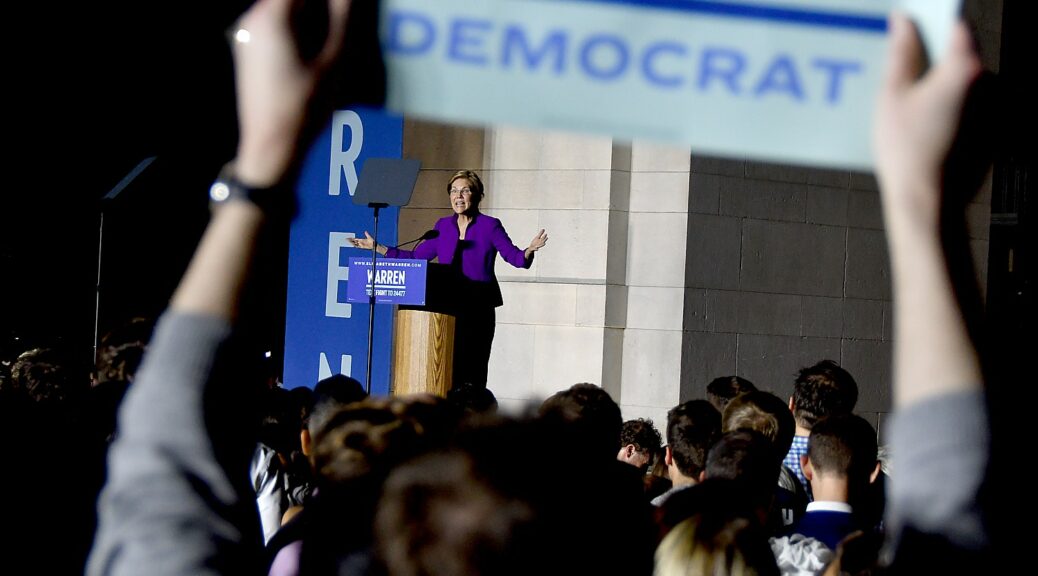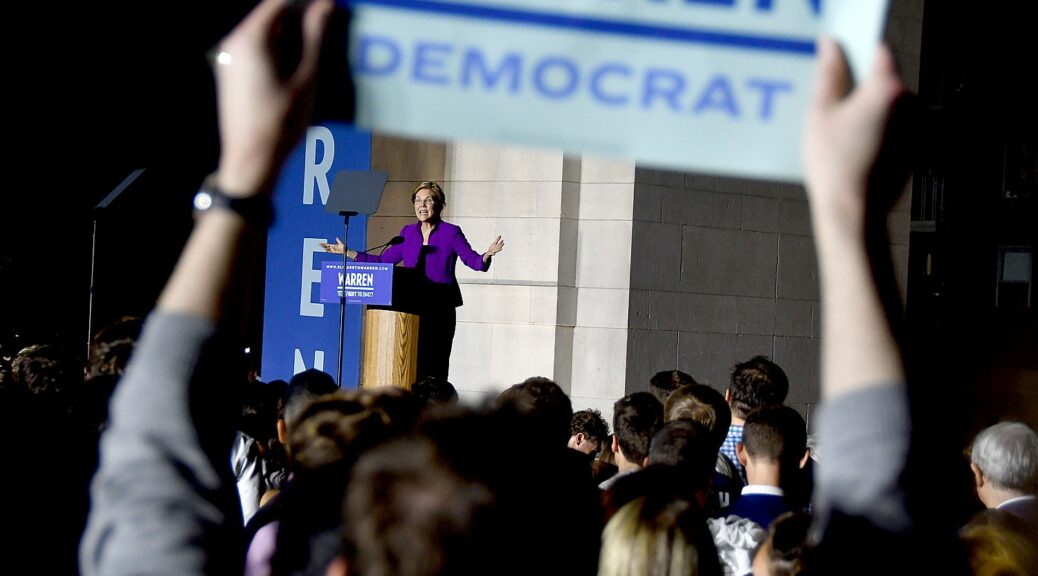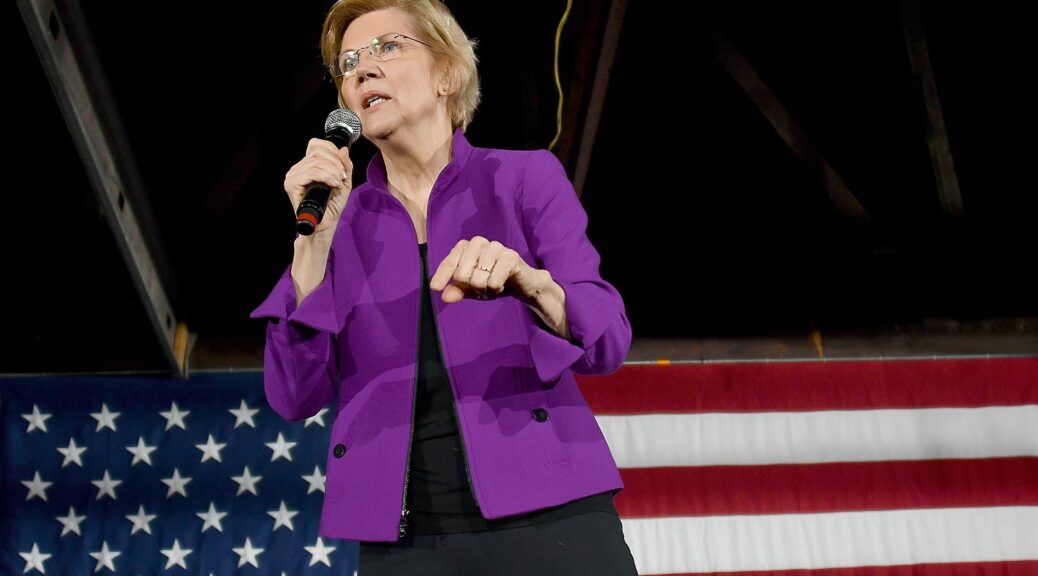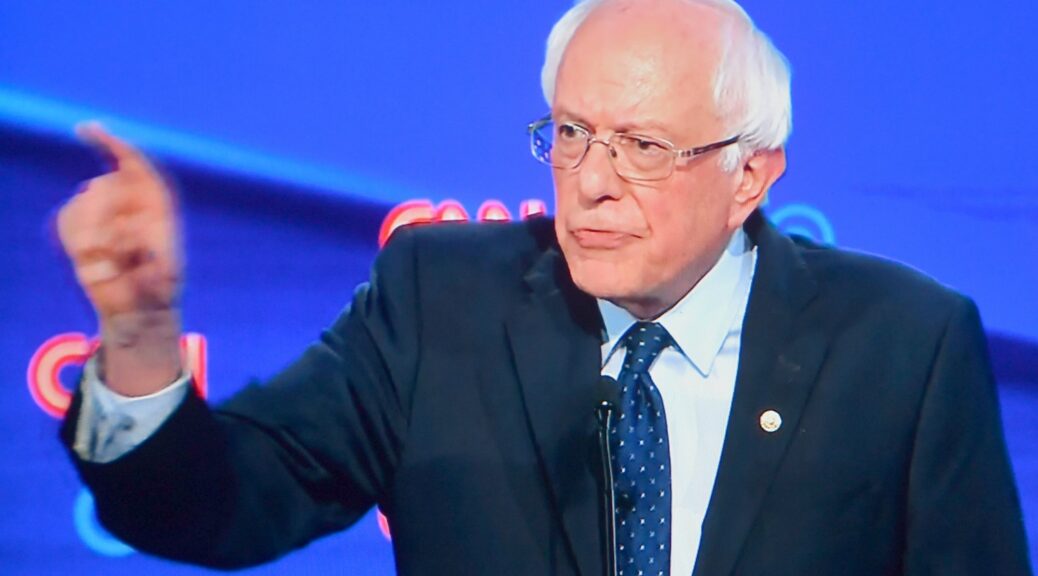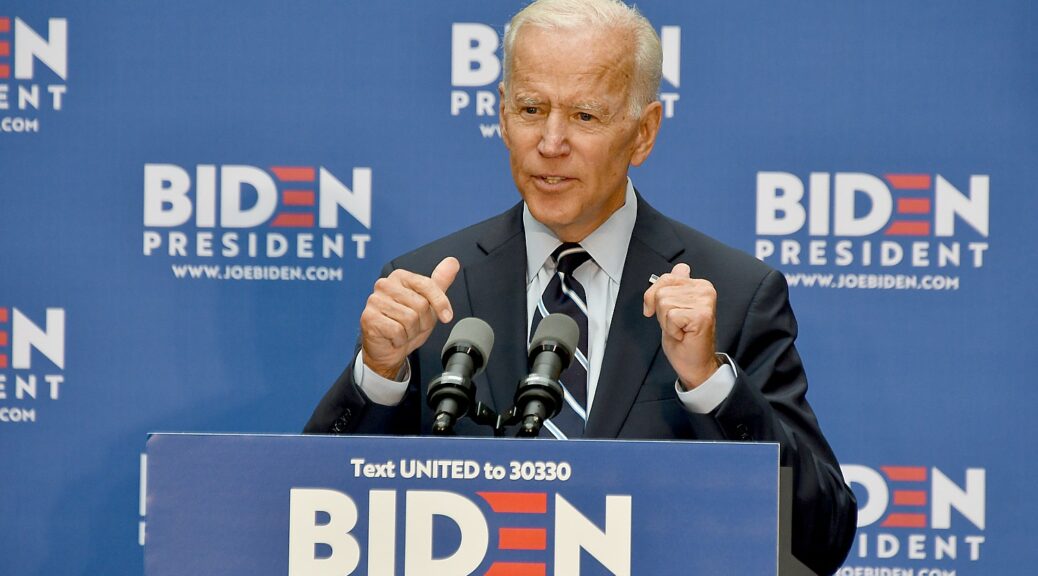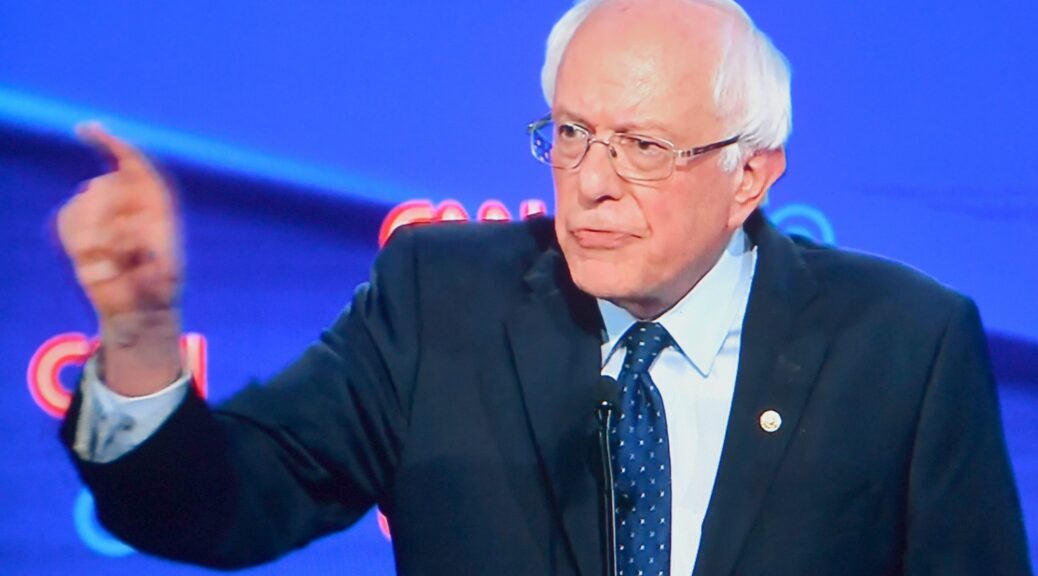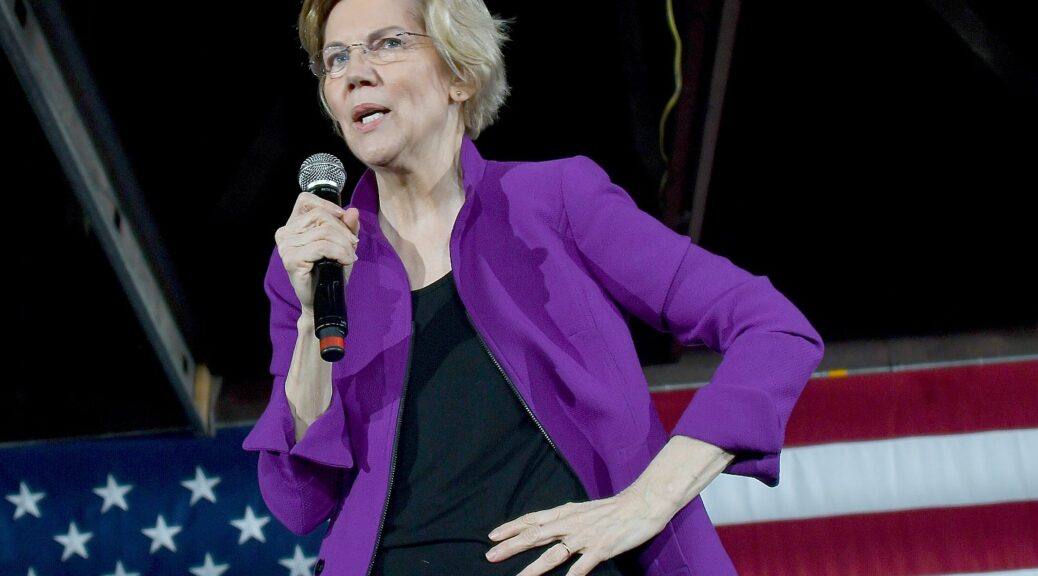
The vigorous contest of Democrats seeking the 2020 presidential nomination has produced excellent policy proposals to address major issues. Ahead of her speech in Washington Square Park near the Triangle Shirtwaist Factory, in which she delineated how corruption in Washington has allowed the rich and powerful to tilt the rules and grow richer and more powerful, Senator Elizabeth Warren released her plan to end Washington corruption.
Warren has already advanced comprehensive anti-corruption legislation in Congress, but she is going further with a set of far-reaching and aggressive proposals. “Her plan will end lobbying as we know it, end self-dealing in the White House, end corporate capture of the federal government’s rule-making process, hold our federal judiciary and the Supreme Court to the highest ethical standards, and more.”
Warren declared, “No matter what brings you into this fight — whether it’s child care, student loans, health care, immigration, or criminal justice, one thing is crystal clear: corruption is making it worse — and it’s at the root of the major problems we face as a democracy.
“Reforming the money game in Washington isn’t enough. We also need to comprehensively clean up our campaign finance system. That’s why I’ve also called for a constitutional amendment to overturn Citizens United. It’s why we need to get rid of the Super PACs and secret spending by billionaires and giant corporations that try to buy our democracy. It’s why we need to break the grip that big donors have by creating a system of exclusive public funding of our elections. But even if we solve our campaign finance problems, comprehensive anti-corruption reforms targeted at Washington itself are necessary to finally end the stranglehold that the wealthy and the well-connected have over our government’s decision-making processes.
“I believe that we can root out corruption in Washington. I believe we must make big, structural changes that will once again restore our trust in government by showing that it can work for all of us. And when I’m President, that’s exactly what I’ll do.”
This is from the Elizabeth Warren campaign:
In 1958, the National Election Survey first asked Americans a simple question: Do you trust the government to do the right thing most of the time? That year, 73% of Americans said yes.

In 2019, that number is just 17%. Five out of every six Americans do not trust their government to do the right thing.
Why have so many people lost faith in government?
It’s true that right-wing politicians have spent a generation attacking the very idea of government. But it’s also true that these days, our government doesn’t work for most people. Sure, it works great for the wealthy and the well-connected — but for everybody else, it doesn’t.
It doesn’t work because big insurance companies and hospital conglomerates put profits ahead of the health and well-being of the American people, and dump piles of money into political campaigns and lobbying efforts to block any move toward Medicare for All.
It doesn’t work because big oil companies that have concealed climate studies — and funded bought-and-paid-for climate denial research — bury regulators in an avalanche of shady, bad-faith pseudoscience and then spend freely on influence peddling in Congress to make sure nothing like a Green New Deal ever sees the light of day.
It doesn’t work because giant pharmaceutical companies want to squeeze every last penny out of the people who depend on their prescriptions, while their army of lobbyists suffocates reform any time there’s a discussion in Congress on drug pricing.
Universal child care. Criminal justice reform. Affordable housing. Gun reform. Look closely, and you’ll see — on issue after issue, widely popular policies are stymied because giant corporations and billionaires who don’t want to pay taxes or follow any rules use their money and influence to stand in the way of big, structural change.
We’ve got to call that out for what it is: corruption, plain and simple.
Make no mistake about it: The Trump Administration is the most corrupt administration of our lifetimes.
Foreign nations, like Saudi Arabia, funnel money into Trump’s pockets by spending freely at his hotels.
Trump’s tax bill is a $1.5 trillion giveaway that primarily helps large corporations and wealthy Americans. Half of the total registered lobbyists in Washington worked on issues involving the word “tax” the year the bill was written — that’s eleven lobbyists for every member of Congress. And when the members of Congress who championed it lost their elections, they got juicy gigs in the lobbying industry themselves.
Trump’s Supreme Court Justices were hand-picked by right-wing extremist groups that spent millions on television ads — first to hold open a Supreme Court seat in the Obama Administration, and then to pressure the Senate to rubber stamp their candidates of choice, even when it meant ignoring serious sexual assault charges to ram through the confirmation.
Trump’s pick to lead the Environmental Protection Agency was a climate denier with ties to Big Oil — and when he was forced to resign after a slew of ethics violations, Trump replaced him with a former coal lobbyist.
Our nation’s ambassadors are a who’s who of Trump’s biggest donors and Mar-a-Lago members.
And that’s just the tip of the iceberg.

But these problems did not start with Donald Trump. They are much bigger than him — and solving them will require big, structural change to fundamentally transform our government.
That’s why I’ve released plans to fight Washington corruption. A plan to make sure that no president is above the law. A plan to tackle defense contractor coziness at the Pentagon. A plan to ban private prisons and expand oversight, transparency, and enforcement for all contractors hired by the federal government. In Congress, I’ve previously advanced wide-ranging anti-corruption legislation.
But we must go further.
Today, I’m announcing a comprehensive set of far-reaching and aggressive proposals to root out corruption in Washington. It’s the most sweeping set of anti-corruption reforms since Watergate. The goal of these measures is straightforward: to take power away from the wealthy and the well-connected in Washington and put it back where it belongs — in the hands of the people.
My plan lays out nearly a hundred ways that we can change our government to fix this problem — from improving public integrity rules for federal officials in every branch of government to ending lobbying as we know it, fixing the criminal laws to hold corrupt politicians to account, and ensuring our federal agencies and courts are free from corrupting influences.
And I’m just getting started.
Restoring Public Integrity
If you choose to be a public servant, you should serve the public — not your own financial interests or the financial interests of the rich and powerful. But we face a crisis of confidence in the ethics and public integrity of federal officials in America. The revolving door in and out of the Trump Administration is spinning out of control, and wave after wave of people in Trump’s orbit are trying to profit personally from his presidency — including him.
But even before Trump entered the White House, our nation’s public integrity rules were far too lax. Too many public officials can easily leverage public service for personal gain. And the ability to walk around government with obvious and direct personal financial conflicts reduces public faith in honest officials. To fix this, we need a total rewrite of our ethics laws.
We must begin by rooting out financial conflicts of interest in Washington.
Donald Trump is a walking conflict of interest. Actually, more like 2,310 conflicts of interest — and counting. His refusal to divest from his businesses has opened the door for giant corporations, foreign lobbyists, and our own government officials to curry favor with his administration and pad his own bottom line.
According to a study by the Citizens for Responsibility and Ethics in Washington, Donald Trump has visited one of his own properties for nearly a third of the total days that he has been president. Trump’s Washington hotel even sent the federal government a bill for $200,000 because Secret Service agents were forced to stay there as well.
Foreign countries have also taken the hint. Representatives from 65 foreign governments have visited Trump properties since he took office, and embassies have begun booking Trump’s hotels for their events. Trump has egged them on, shamelessly floating another one of his properties as the venue for a future international summit.
Big corporations and billionaires have also tried to curry favor with Donald Trump by patronizing his properties. T-Mobile sent its top executives to the Trump Hotel in DC right after the company announced a merger requiring the Trump administration’s approval. Payday lenders held their annual meetings at Trump’s golf club in Miami, while the Trump administration has consistently gutted restrictions and regulations on exploitative payday lenders. And several wealthy donors who pay the $200,000 Mar-a-Lago membership fee — which doubled when Trump became President — have exerted “sweeping influence” at the Department of Veteran’s Affairs.
Even Trump’s own appointees and political allies have tried to suck up to Trump by exploiting his conflicts of interest. More than 100 Republican Members of Congress have become patrons of Trump’s businesses since he became President. Most recently, Trump’s Attorney General William Barr spent $30,000 at Trump’s Washington Hotel, implausibly claiming that it was the only place he could find for his holiday party in Washington — and on an official trip to Ireland, Vice President Mike Pence stayed at a Trump property reportedly at Trump’s instruction, even though it was three hours away from his scheduled meetings in Dublin.
Trump is by far the most egregious example — and we need new rules to hold leaders accountable for this kind of conduct. But we cannot condemn this conduct without also acknowledging that opportunities for the appearance of self-dealing are far too easy across the federal government. Restoring public confidence isn’t just about replacing Trump and his cronies. We need new bright lines and clear rules to eliminate the possibility of public officials serving private interests.

Here’s where I would start:
End self-dealing in the White House by applying conflict of interest laws to the President and Vice President. Under my plan,Presidents and Vice Presidents would be required to place their businesses into a blind trust to be sold off. No more payoffs. No more bribes from foreign governments. No more self-dealing.
Disclose tax returns of federal candidates and officeholders to the public automatically. Tax return disclosure for federally elected officials shouldn’t be optional — it should be the law. And it shouldn’t just apply to Presidents — it should apply to everyone running for or serving in federal elected office. Presidential candidates, in particular, should follow the standard set by Barack Obama for releasing at least eight years of returns. (I’ve released eleven.) And the IRS should simply put out the required tax returns for qualified candidates themselves — so nothing like Donald Trump’s refusal to disclose his taxes can ever happen again.
Force senior government officials to divest from privately-owned assets that could present conflicts of interest. White House advisers like Jared Kushner have been allowed to use their government positions to further enrich themselves and their families, while Cabinet Officials like Betsy DeVos have hundreds of millions held in privately-owned accounts that make it nearly impossible to determine who could exercise influence over DeVos and her family. The fact that such conduct could pass any kind of ethics screen makes it clear that we need new rules. My plan puts an end to this practice by requiring senior officials, including those who are unpaid like Kushner, to divest from their businesses and other conflicted assets.
Completely ban the practice of government officials trading individual stocks while in office. Under current law, members of Congress can trade stocks and then use their powerful positions to increase the value of those stocks and pad their own pockets. Tom Price, Trump’s former Secretary of Health and Human Services, purchased pharmaceutical stocks while in the House of Representatives — then fought hard to get a return on his investment by pushing policies that would benefit giant pharmaceutical companies. And another member of Congress, Chris Collins, was charged for trading the same stocks based on insider information. But prosecutions like this are rare. And even where investments don’t influence decisions, the existence of these direct conflicts undermine public confidence in government.
The solution is simple — ban members of Congress and senior government officials from owning or trading individual stocks. Instead, they can invest in conflict-free mutual funds or funds managed by the federal Thrift Savings Program. Law firms follow these kinds of rules to prevent the appearance of financial conflicts with the interests of their clients — there’s no reason important public servants and elected officials shouldn’t, too.
Shut down a raft of additional shady practices that provide opportunities for government officials to serve their own financial interests. My plan bans members of Congress and senior congressional staff from serving on corporate boards — whether or not they’re paid to do so. It also strengthens ethics requirements for presidential transition teams to ensure that those who are shaping our government disclose any conflicts of interest and comply with the highest ethical standards. And to ensure that there are no questions about whether members of Congress are acting based on financial conflicts, like lobbyist-turned-Senator-turned-lobbyist Jon Kyl, my plan requires every member of Congress, including appointed ones, to disclose their financial conflicts before they take office.

Finally, we must immediately end the possibility of trading on access to insider political information. Every year, hundreds of millions of dollars flow into so-called “political intelligence” firms that hire operatives to prowl the halls of Congress for insider information and sell that information to Wall Street traders trying to make a buck. My plan combats this practice by implementing strict disclosure requirements and regulations on so-called “political intelligence consulting,” including criminal penalties for former public officials who use insider political information to make investments or advise others who are doing so.

Next, it’s time to close and padlock the revolving door between government and industry.
Donald Trump has not just enriched himself and his advisers; he has turned his White House into a case study in the dangers of the revolving door between industry and government.
Trump railed against Goldman Sachs on the campaign trail in 2016. But as soon as he was elected, he tapped more than half a dozen of the firm’s employees to fill senior positions in his administration — enough to open a new Goldman Sachs branch office.
One of these people was Gary Cohn, the former President of Goldman Sachs, who became Trump’s top economic adviser. On his way out of Goldman, the firm gave him a whopping $285 million — $123 million in the form of cash and stocks that he could only collect if he left the firm to work in government.
I call that a “pre-bribe.” And it paid off, too. While cashing that $285 million check, Gary Cohn helped rewrite our nation’s tax laws, rammed the changes through Congress, and gave Goldman Sachs their money back — and a few billion dollars in change.
There are countless examples like this in the Trump Administration, but it’s a widespread problem in official Washington — and it goes far beyond obvious and egregious quid-pro-quo bribery. When someone serves in government with plans to immediately turn around and work in the industry they’ve been overseeing, that individual faces obvious incentives to advance the interests of their future employer. And when someone moves immediately from a regulated company to a job regulating that company, the public is right to worry about the risk that such individuals will prioritize the interests of their old bosses.
Government must be able to benefit from tapping private sector expertise, and public servants who leave government should be able to find post-government employment. Similarly, volunteer and part-time government positions, which make sense in certain situations, necessarily assume some level of outside work. But there is a difference between expertise and graft.
It isn’t simply a matter of replacing Trump with an honest President. We’ve seen the issue of industry lobbyists and top execs spinning freely through the revolving door to and from important government positions in both Democratic and Republican administrations. Fixing the underlying problem requires us to tighten up the rules to ensure that when government officials are making decisions, they are considering only the public interest — and not their own personal interests or the interests of their friends and future employers.

Here are some obvious steps to help address this problem:
Ban “golden parachutes” that provide corporate bonuses to executives for serving in the federal government. We can’t let big companies get away with installing their top executives in senior government positions and paying them pre-bribes on their way out the door. Under my plan, this would be illegal.
Restrict the ability of lobbyists to enter government jobs. Under my proposal, current lobbyists won’t be able to take government jobs for 2 years after lobbying, with limited exceptions for when the hiring is in the national interest. Corporate lobbyists will have to wait at least 6 years — no exceptions, and no waivers. These extensive cooling off periods will help ensure that if anyone with this background is hired into a government role, they are being selected because of their expertise, and not their connections.
Make it illegal for elected officials and top government appointees to become lobbyists — ever. My plan bans Presidents, Vice Presidents, Members of Congress, federal judges, and Cabinet Secretaries from ever becoming lobbyists — not for one or two years, but for life. All other federal employees will also be barred from lobbying their former office, agency, or House of Congress after they leave government service for at least 2 years — or 6 years for corporate lobbyists.
Restrict the ability of companies to buy up former federal officials to rig the game for themselves. Under my plan, companies would be banned from immediately hiring former senior government officials whose agency or office the company has lobbied in the past two years. And because the biggest and most market-dominant corporations in America also exercise outsized political power, my plan blocks them from using personnel hires to rig the game by banning giant companies, banks, and monopolies from hiring former senior government officials for at least four years.
Next, we’ll hold our federal judiciary to the highest ethical standards.
Giant corporations and powerful interests haven’t limited their influence-peddling to Congress and the White House. They’ve also turned their attention to the courts.
There is “no formal mechanism for review of conflicts” for Supreme Court justices. But covering your eyes doesn’t mean there’s nothing to see. The Federalist Society — an extremist, corporate-funded right-wing group that hand-picked Trump’s list of Supreme Court nominees — picked up Justice Clarence Thomas’s bills to attend a fancy retreat hosted by the Koch brothers. And for years, Justice Thomas failed to file public disclosures indicating that his wife worked as the White House liaison for the Heritage Foundation, a group whose co-founder personally began the conservative push to overturn Roe v. Wade.
It’s not just Supreme Court Justices, either. Federal judges can do just about anything without disclosing it, and in the rare instance where their ethical violations are discovered and they face investigation, they can escape further scrutiny altogether by resigning without penalty.
Our federal court system only works if the American people have faith that it is neutrally dispensing fair-minded justice without bias or personal interests interfering in judicial decisions. If we want the American people to believe this, we need some serious judicial ethics reforms.

Here’s where I’d start:
Ensure Supreme Court Justices are held to the same standard as the rest of the federal judiciary. Today, every federal judge is bound by a Code of Conduct — except Supreme Court justices. It’s a recipe for corruption. We can fix it by applying the Code of Conduct for United States Judges to Supreme Court justices.
Strengthen ethics requirements for federal judges. Corporations and advocacy organizations routinely provide federal judges with all-expenses-paid trips to extravagant seminars. My plan tightens existing rules that prohibit judges from accepting gifts and establishes a new fund to cover reasonable expenses for participating in judicial seminars. No more big speaking fees and no more fancy trips to hunting lodges and golf courses. My plan also bans federal judges from owning individual stocks.
Require judges to disclose key information so the American people can verify that their conduct is above ethical reproach. My plan requires the Judicial Conference of the United States — the institution in charge of administering our federal courts — to publicly post judges’ financial reports, recusal decisions, and speeches to bring these activities out of the shadows. This will build public confidence that cases are being heard by fair and independent judges.
Close the loophole that allows federal judges to escape investigations for misconduct by stepping down from their post. When Ninth Circuit Judge Alex Kozinski was confronted with a judicial ethics investigation for sexual misconduct towards young female law clerks, he resigned — and the investigation immediately ended. Similarly, sexual assault and perjury complaints against Brett Kavanaugh were dismissed when he was confirmed to the Supreme Court, and Donald Trump’s sister Maryanne Trump-Barry resigned from the bench, ending an investigation into the Trump family’s decades-long tax schemes, including potential fraud. Under my plan, investigations will remain open until their findings are made public and any penalties for misconduct are issued.
Ending Lobbying As We Know It
The fundamental promise of our democracy is that every voice matters. But when lobbyists and big corporations can buy influence from politicians, that promise is broken. The first thing to do to fix it is to end lobbying as we know it.
The Constitution guarantees the American people the right to petition their government with grievances. Lobbying isn’t new — it’s been around for centuries. What’s new is the weaponization of lobbying to coerce our government into doing whatever corporate interests want. While companies have an important role to play in our democratic conversation, the voices of corporations and powerful interests shouldn’t be the only voices in the room. But that’s exactly what’s happened.
Prior to the 1970s, there was little corporate spending on lobbying. Last year, over eleven thousand registered lobbyists roamed the halls of government, mostly representing their powerful clients — to the tune of over $3 billion. It’s no wonder everyone else has such a hard time breaking through the noise.
This boom in the influence-peddling game has happened around the same time that right-wing ideologues have slashed independent government resources and in-house expertise, which are essential for officials to maintain their independence from the “expertise” of self-interested corporate lobbyists. Meanwhile, most corporate lobbying work remains hopelessly opaque — nominally governed by a patchwork of weak definitions, few meaningful restrictions, and inadequate reporting and disclosure requirements. And the free rein granted to corporate lobbyists to also fundraise for political campaigns crosses the line from influence peddling to legalized bribery.
We can break the grip that lobbyists for giant corporations have on our government. Together, we can end lobbying as we know it. Here’s where to start:
Expand the definition of lobbyists to include everyone who is paid to influence lawmakers. Because of our weak laws, only individuals who meet directly with politicians or spend more than 20% of their time lobbying are required to register as lobbyists. That means law firms, consultancies, and even self-described lobbying firms that hire individuals for the express purpose of influencing government may be able to avoid these registration requirements — allowing powerful interests to influence policy without any public accountability. This practice, endemic on both sides of the aisle, must end.
My plan brings this activity out of the shadows by strengthening the definition of a lobbyist to include all individualspaid to influence government. It also creates a new designation for corporate lobbyists to identify individuals paid to influence government on behalf of for-profit entities and their front-groups — and subjects these corporate hired guns to additional restrictions.
Ban lobbying for foreign entities — period. President Trump’s campaign chair currently sits in prison, convicted in part of failing to properly register his shady foreign lobbying activity on behalf of Ukraine. But what is the justification for allowing foreign governments to use Americans as hired guns who sit in the shadows, quietly attempting to influence our domestic political system? That’s not how diplomacy should work. Other nations have ambassadors and diplomatic staff in the United States. If those governments want to interact with our political process they can do so through normal, above-board diplomatic channels. My plan categorically bans the practice of private lobbying for foreign governments, foreign individuals, and foreign companies. No more K Street influence-peddlers looking out for the interests of China, Russia, or Saudi Arabia.
Impose strict rules on all lobbyists, including preventing them from donating to or fundraising for political candidates. Paid lobbyists are hired for one objective: to advance the interests of their clients. Allowing individuals who are paid to influence government officials on policy to also give gifts or funnel money to the political campaigns of those same officials sounds like legalized bribery. My plan not only bans lobbyists from making political contributions, it also bans them from bundling donations or hosting fundraisers for political candidates. And it outlaws lobbying contingency fees, where lobbyists are only paid if they successfully influence politicians to achieve a policy outcome that serves their client’s narrow interests.
Dramatically expand the kinds of information lobbyists are required to disclose. Our current laws require only minimal disclosure from lobbyists of their activities. This prevents the American people from fully understanding who is trying to influence government — and why. My plan requires all lobbyists to report publicly all meetings with Congressional offices or public officials, the documents they provide to those individuals, and all government actions they attempt to influence. It also demands that all charitable non-profit organizations, social welfare organizations, and trade associations disclose any donors whose money was used to develop products to influence Congressional testimony, agency rulemaking, or for lobbying purposes.
Impose a tax on excessive lobbying — and use this revenue to give Congress and agencies the tools to fight back against the corporate influence machine. In 2018, lobbyists spent a whopping $3.4 billion trying to influence public policy on behalf of their clients, including $95 million from the pro-corporate Chamber of Commerce, $73 million from the National Association of Realtors, and $28 million from the Big Pharma lobbying group. The right to petition our government does not allow industries to exercise unlimited financial influence over policymakers. That’s why I will impose a tax on any entity that spends over $500,000 per year on lobbying. The tax will reduce the financial incentive for excessive lobbying, and its revenue will be used to counter the effects of excessive lobbying by providing additional financial resources for agencies to research and review regulatory actions that are the targets of excessive lobbying activity, as well as additional funding for the National Public Advocate, an office established to help the public engage with the rulemaking process, and for Congressional support agencies.
Strengthen Congressional independence from lobbyists. Congressional offices and agencies are severely underfunded, creating unnecessary pressure to rely on lobbyists for expertise. My plan transitions Congressional staff to competitive salaries and reinstates the nonpartisan Congressional Office of Technology Assessment to help members of Congress understand new areas of science and technology — because members of Congress should be able to access expertise and information without being dependent on lobbyists.

End Corporate Capture of our Federal Agencies
Major federal agencies — agencies like the Environmental Protection Agency, the Department of Labor, and the Department of Energy — were created by Congress to enforce and implement laws that protect the broad interests of the public against the unrestrained exercise of corporate power. But because of the revolving door, the avalanche of lobbyists, and the weakness of our agency tools to fight back, agencies often find their agendas hijacked by the very industries they are supposed to regulate. We can and should make additional changes to strengthen agencies’ independence and their ability to act decisively in the public interest.
Here are some of the steps my plan takes to address this:
Stop powerful actors from peddling fake research — often funded by undisclosed donors — and hold corporations accountable for lying to regulators. I’ll crack down on corporations who manipulate agencies by submitting sham research — like the climate denial studies bought and paid for by oil and gas magnates like the Koch Brothers — by requiring individuals who submit a public comment on a proposed rule to disclose editorial conflicts-of-interest related to any non-peer-reviewed research they cite. Studies that are determined to have conflicts of interest will be withheld from the rulemaking process unless the individual offering that research certifies that they have undergone rigorous, independent peer review. Otherwise, we’ll treat them like the bad faith junk science that they are, excluding them from the rulemaking process and preventing any court from considering them too. And if a company misleads an agency with “analysis” it knows to be false, they’ll be prosecuted just like anyone else who lies under oath to Congress or in a court of law.
End the practice of inviting corporate bigwigs to negotiate rules their companies would have to follow and put a stop to the stall tactics they use to kill public interest rules. My plan restricts the parties eligible to participate in the negotiated rulemaking process so that industry no longer has an open door to dominate the process. It also closes the loopholes that have allowed industry and agencies to delay the implementation of rules it disfavors, including by ending so-called informal review, reducing the review period to 45 days, and clarifying that only Appeals Courts — not individual Federal District judges — can temporarily block the implementation of rules. And my plan requires agencies to publicly justify the withdrawal of any public interest rules.
Give the public the tools to fight back against corporations who seek to co-opt this process for their benefit. My plan establishes an Office of the Public Advocate to help the public engage with important legal changes made by federal agencies during the rulemaking process. I’ll also allow private individuals to bring lawsuits against federal agencies for unnecessarily delaying or failing to enforce agency rules — and against corporations who have violated them.
Ensuring Access to Justice for All
Equal justice is supposed to be the promise of the American legal system. But it’s not delivering on that promise. Instead, we have one system for the wealthy and the well-connected, and a different one for everyone else. It’s hard enough to hold a powerful company accountable through our legal system, but recent developments in the law have made it even harder for individuals to even bring those cases in the first place. We need to reform our legal rules to make sure every person who has been harmed can have their day in court.
Here’s how I’ll start:
Ban forced arbitration clauses. Many companies force their employees and consumers to sign “forced arbitration” clauses as part of their contracts for employment or for services. These clauses mean that if something goes wrong, individuals agree to never file a lawsuit in federal court against the company — and instead are diverted into a private dispute system. These provisions are often tucked in the fine print of contracts that workers or consumers sign, and many people don’t even know that they have signed one until they have been harmed and need our courts to help them get justice. These provisions shouldn’t be enforceable, but the conservative majority in the Supreme Court decided that because there was no law explicitly against them, they could be freely enforced. So let’s pass that law. My plan categorically bans forced arbitration clauses from blocking lawsuits related to employment, consumer protection, antitrust, and civil rights.
Ban mandatory class action waivers. When workers or consumers are wronged by a company, they should be able to band together and seek justice. Taking on a big corporation’s army of lawyers takes enormous sums of money and legal expertise. But class action waivers tucked into consumer and employment contracts prevent individuals from suing together. That makes it virtually impossible to pursue a lawsuit, and gives companies unlimited license to rip you off without any consequences. These anti-worker and anti-consumer provisions shouldn’t be enforceable, but because of a Supreme Court decision written by Justice Gorsuch, they’re alive and well. That’s why my plan would restore the fundamental right of workers and consumers to join together when they are wronged by banning these provisions in employment, consumer protection, antitrust, and civil rights cases.
Restore fair pleading standards. When you file a lawsuit, one of the first steps of the legal process is called “discovery.” That’s when you’re supposed to ask questions and gather facts about your case, but a pair of recent Supreme Court decisions upended decades of pleading standards, making it difficult to file a case without already having many of these facts. These widely criticized cases deprive plaintiffs of their day in court, and allow powerful defendants to successfully dismiss cases before they even begin. My plan would undo this damage by restoring fair pleading standards so that every person who has been harmed gets their day in court.
Holding Bad Actors Accountable
The reforms I’ve outlined will go a long way toward cleaning up Washington. But we also need strong enforcement mechanisms and broad transparency requirements to make sure we can hold bad actors accountable.
Let’s start with real penalties for violating the rules.
When Secretary Ben Carson was warned about his son participating in fancy government events, he brushed it off. And when an independent federal ethics watchdog determined that Kellyanne Conway should be fired for repeatedly violating federal law, the administration barely cared.
In Washington, corrupt actors should face penalties when they break the law — not return to business as usual.
Here’s how my plan would fix this:
Establish a new U.S. Office of Public Integrity and strengthen ethics enforcement. The new office will investigate ethics complaints from the public, impose civil and administrative penalties on violators, and refer egregious violations to the Department of Justice for criminal prosecution.
Expand and strengthen the independent Office of Congressional Ethics. My plan ensures this office has the proper authorities and resources to conduct investigations, refer civil and criminal violations to the appropriate authorities, and recommend disciplinary action to the House and Senate Ethics Committees.
Expand the definition of “official act” in bribery statutes to criminalize the sale of government access. When a politician accepts gifts in exchange for government favors, that’s bribery — but thanks to a wrong-headed Supreme Court decision in United States v. McDonnell, our laws don’t fully recognize it. My plan plugs that tractor-sized loophole and ensures that corrupt politicians who accept bribes can be prosecuted. It also clarifies that a stream of benefits — rather than a single act — qualifies as an unlawful benefit paid in exchange for a bribe.
Clarify the definition of “in-kind contributions” to ensure that no future candidate can receive political assistance from foreign countries or solicit large hush money payments without facing legal consequences. Politicians and advisors like Donald Trump Jr. have reportedly tried to receive help from foreign countries, even though it is illegal for foreign individuals to provide in-kind contributions to campaigns. And Donald Trump directed Michael Cohen to spend $130,000 to cover up an affair so it would not come to light before the 2016 election, despite laws preventing him from soliciting large in-kind contributions. Although a federal judge accepted Cohen’s guilty plea, Trump’s lawyers and defenders continued to insist that what Cohen did — and what Trump solicited — was not a crime. My plan settles this debate and clarifies that the rules governing in-kind contributions also apply to intangible benefits, such as dirt on political opponents, and in-kind financial contributions, like the payment of hush money, when those contributions are made at least in part — even if not exclusively — for campaign purposes.

Deter Corruption Through Broad New Government Transparency Standards
If government is supposed to work for the people, then the people should be given enough information to judge how well their government is working for them. Too many government records are kept behind lock and key, making it impossible for the public to hold their government accountable. Significant legal actions that have implications for public health and safety can be kept secret. And the actions of federal contractors — the companies often tasked with the implementation of government policies and programs, like Trump’s family separation policy — are almost completely concealed from public view, thanks to an assortment of exemptions and loopholes.
Here’s how my plan would shine a light on government activity:
Prohibit courts from sealing records involving major public health and safety issues. When people were killed by ignition defects in Chevrolet vehicles, General Motors settled the cases on the condition that all documents related to the defects would be sealed from public view. It wasn’t an isolated incident. Big corporations routinely use secret settlements to keep defective products on the market so they can continue to rake in profits. That must stop. My plan bans courts from sealing records in cases involving public health and safety, with rare exceptions, so that corporations cannot conceal these dangerous conditions from the American people.
Impose strict transparency standards for federal courts and remove barriers to accessing electronic judicial records. My plan requires federal appellate courts to livestream audio of their proceedings, share case assignment data in bulk, and make all electronic case records — which currently must be purchased from the government — more easily accessible and free of charge.
Strengthen federal open records laws to close loopholes and exemptions that hide corporate influence, and increase transparency in Congress, federal agencies, and nonprofits that aim to influence policy. The American people have a right to know whether their elected leaders are acting in the public’s best interest — and who is trying to influence them. Under my plan, Congressional committees, government agencies, and federal contractors would be required to publicly release key information so that the American people — and the American press — can hold the federal government accountable.
Read more about her plan here

